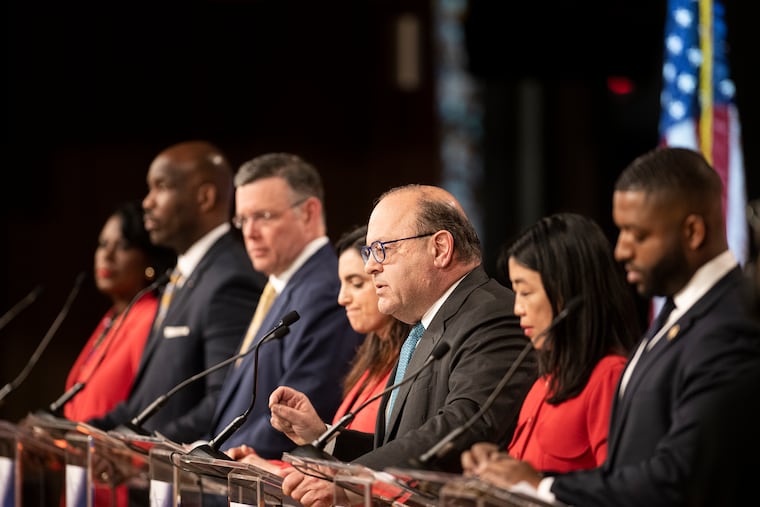Where each of the top contenders for Philly mayor stand on supervised-injection sites
Three of the top five contenders for Philadelphia mayor have said they are opposed to supervised-injection sites.

Three of the top five Democratic contenders running for mayor say they oppose establishing a supervised-injection site in Philadelphia, meaning the May primary election could determine the future of such a facility in the city.
Years-long settlement talks between the U.S Justice Department and the nonprofit that has proposed launching a site in Philadelphia could soon clear the way for establishing such a site, where people could consume drugs under medical supervision.
Proponents — including Mayor Jim Kenney — have said supervised-injection sites are a harm-reduction strategy aimed at preventing overdose deaths. But plans to establish one in Philadelphia have proved controversial. The nonprofit, Safehouse, attempted to quietly open a site in South Philadelphia in early 2020, but the plans were tabled amid steep opposition.
Of nine Democratic mayoral candidates who will appear on the primary ballot, five are top contenders based on fundraising, institutional support, and limited polling. Three — businessman Jeff Brown and former City Councilmembers Allan Domb and Cherelle Parker — have said they oppose supervised-injection sites.
Former City Councilmember Helen Gym has in the past supported establishing one in Philadelphia. Ex-City Controller Rebecca Rhynhart said she has not “ruled them out.”
Republican David Oh, who is running in the primary unopposed, has said he is against the sites.
Here’s what the top Democratic mayoral candidates have said recently about the issue:
Jeff Brown
Brown has said he is opposed to establishing a supervised-injection site in Philadelphia. His plan to address the opioid crisis is in part focused on expanding access to drug courts and treatment as a means to divert people with an addiction away from the criminal-justice system.
Brown was recently endorsed by the Fraternal Order of Police Lodge 5 — the union that represents Philadelphia police officers — which last week joined with 19 community organizations to ask a federal judge to hear their concerns over such a facility before signing off on a settlement.
Allan Domb
Domb said in a statement that he is against establishing a supervised-injection site in the city, and cited the prevalence of xylazine, a powerful animal tranquilizer, that’s contaminated the city’s drug supply.
“I agree with Governor Shapiro that there is ‘no safe way to inject yourself with this type of poison,’” he said. (Josh Shapiro made that statement in 2018 when he was the state attorney general.)
Domb says his strategy to address the opioid epidemic, specifically in Kensington, is focused on coordinating an increased police presence and providing services like transitory housing to people with addiction. Last year, he championed legislation calling on the Kenney administration to declare a state of emergency in Kensington. The administration didn’t do so, though Kenney issued a disaster declaration in Kensington in 2018.
Helen Gym
Among the top contenders for mayor, Gym appears to be the most open to the strategy. In 2017, she was the first City Council member to publicly support establishing a site in Philadelphia, saying at the time that “safe-injection sites are going to be controversial and require us to think and act differently, but they are among the most promising new approaches to come forward while we work to end the opioid crisis.”
But during a recent forum, she was critical of how the city rolled out its planned site in South Philadelphia, saying the city “made a terrible mistake [by] making an announcement about something most people didn’t understand and had never seen before.”
”Harm reduction is an important part of the spectrum of care,” she said. “It’s not a single answer, and it is not the only thing that will solve any issue. … But right now, every single street corner, in front of schools, in front of homes, is an unsafe injection site.”
Cherelle Parker
Parker has been the most vocal opponent of supervised-injection sites on the mayoral campaign trail. She says frequently that she does not support the sites as a strategy to address the opioid crisis, and she often invokes the crack-cocaine epidemic.
“Nobody was talking about a safe crack house in our community back in the ‘80s and the ‘90s,” she said at an event last month.
Asked during a debate Tuesday how she would engage the city’s public-health experts to address gun violence and drug use, Parker responded: “The first thing I wouldn’t do is to employ the use of a safe-injection site.”
”I refer to that as what I call ‘I know what’s best for youse people policymaking,’ when academicians and others attempt to force a particular strategy on a community,” she said.
Rebecca Rhynhart
Rhynhart, who is the among the candidates more aligned with progressive policymaking, said in an interview that she’s open to “a conversation” about a supervised-injection site, but it is not part of her broader strategy to address the opioid epidemic.
Her plan includes a law enforcement-led “drug market intervention” targeting dealers, a multi-department community-responder program, and improving intake processes at facilities where people seek treatment.
”How we are going to get people into help and how we are going to break up the open-air drug market, to me, are the bigger issues,” Rhynhart said. “I don’t think safe-injection sites are the answer, but I haven’t 100% ruled them out either.”